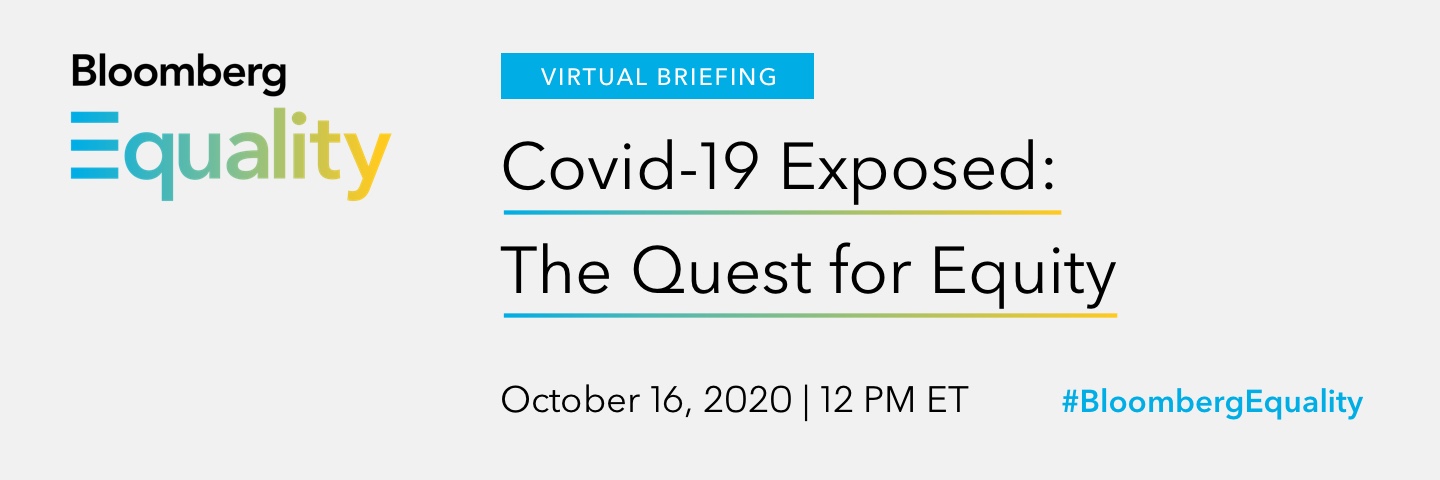
Event Highlights
Bloomberg Equality:
Covid-19: The Quest for Equity
October 16, 2020
By Mallika Kapur, Bloomberg Live
The Covid-19 pandemic has unmasked hard truths about society. Marginalized communities are more susceptible to the consequences – whether intentional or not – of actions that adversely impact the environment.
Air pollution and other actions are closely connected to the disparate health outcomes suffered by vulnerable groups. This cohort also typically bears the brunt of any economic downturn, which is then exacerbated by the fallout. High unemployment makes homeownership and achieving wealth-creation goals unattainable for many.
What can be done to protect the marginalized?
We brought together leaders on the front lines of the environment, housing and wealth creation to discuss innovative solutions that have the potential to reverse decades – if not centuries – of disparities.
Click here to view video of today’s event.
Speakers included:
- Girish Ganesan, Global Head of Diversity and Inclusion and Head of U.S. Talent, TD Bank Group
- Darrick Hamilton, Ph.D., Henry Cohen Professor of Economics and Urban Policy; Founding Director, Institute for the Study of Race, Stratification and Political Economy, The New School
- Chris Herbert, Ph.D., Managing Director, Joint Center for Housing Studies, Harvard University
- Alanna McCargo, Vice President, Housing Finance Policy Center, Urban Institute
- Jacqui Patterson, Senior Director, Environmental and Climate Justice Program, NAACP
- Mitchell J. Silver, FAICP, Commissioner, New York City Department of Parks and Recreation
- Germaine Smith-Baugh, Ed.D., President and CEO, Urban League of Broward County
- Ingrid Waldron, Ph.D., Professor in the Faculty of Health, Dalhousie University
- Valerie Rawlston Wilson, Ph.D., Director, Program on Race, Ethnicity and the Economy, Economic Policy Institute
Bloomberg Hosts Included:
- Prashant Gopal, U.S. Housing Reporter, Bloomberg
- Brentin Mock, Writer and Editor, Bloomberg CityLab
- Donna Wilson, Bloomberg Radio Reporter and Anchor
Event Highlights:
One of the key questions that was raised during the event was how the U.S. economy can benefit from closing the racial wealth gap. Darrick Hamilton of The New School weighed in. He said we need to do it because it is the right thing to do and that we need to have a moral and fair economy. Speaking about the impact of the pandemic on businesses, he said, “Forty percent of Black businesses closed as a result of this pandemic, so the implications of this pandemic are race-specific also and that links to a larger political economy vulnerability, whether we are in a pandemic or not. So that, to me, is an immoral economy – when somebody’s identity matters as it relates to transactions, that’s reason enough to change the economy.”
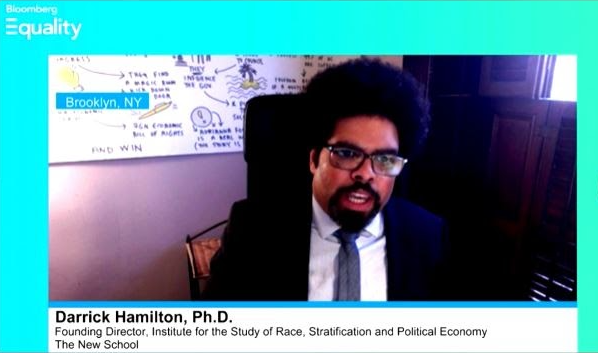
The history of racial exclusion, discrimation, oppression and exploitation is also reflected in the wage gap and when it comes to the job market, said Valerie Rawlston Wilson of the Economic Policy Institute. “For example, the Black rate is typically double the white unemployment rate. In addition to that, for people who are able to get employed, we see patterns of occupational segregation where African Americans, Latinos are likely to be excluded from higher paying occupations. So the combination of these disparities in employment, coupled with the wage gap, contribute to the persistent income gaps we have seen historically,” she said.
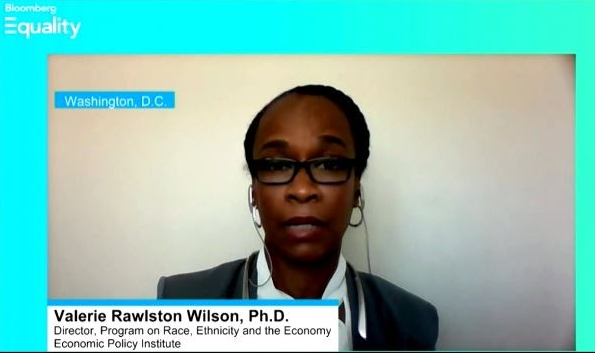
Another discussion centered around housing and, in particular, the housing disparities between whites and people of color. Chris Herbert of Harvard University said we need to break down those barriers. Acknowledging that many people of color are unable to provide the necessary down payment to step onto the first rung of the housing ladder, he said we need to provide more financial assistance upfront, so that buyers can meet the down payment, mortgage and closing cost requirements. He went on to say, “the really important issue here is the historical legacy of discrmination in housing markets which contributes to the fact that African Americans today have 30 percentage points lower home ownership rates than whites or Hispanics. What that means is your parents don’t own homes. And one of the primary ways buyers get into home ownership is from help from family and friends.” He said since society has put up barriers towards home ownership for multiple generations, there is now an obligation to provide people of color with the assistance they need to buy a home.
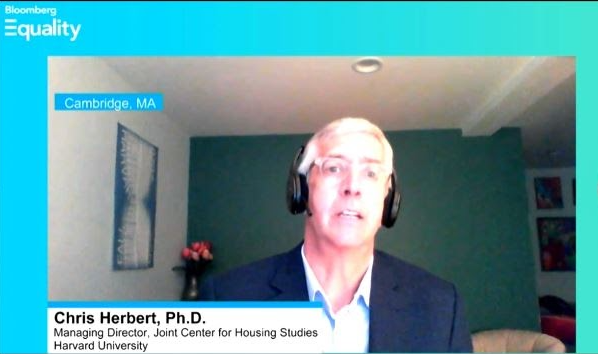
We engaged our audience via a poll on social media and we asked them: What is the best way to boost Black and Hispanic home ownership? Nearly half, 46% of them said it was by creating more job opportunities. Only 10% said eliminating down payments was the way to go.
We were pleased to be joined by Mitchell J. Silver, FAICP, Commissioner, New York City Department of Parks and Recreation, for a conversation about using a data-driven approach to making park access more equitable and available in every neighborhood. “We all know how important parks and open spaces are not just for physical health but mental health, more so during Covid,” he said. When Silver looked back at how much New York has spent on parks over the last 20 years, he found the figure was $6 billion. The question he raised, “How equitable was it?” Turns out, it wasn’t. The parks that did not benefit from the funds were in neighborhoods that housed black and brown communities. The Department of Parks and Recreation has since turned its attention to redeveloping these parks and Silver says, “It’s been a savior that people have access to public, quality space that they did not have before.”
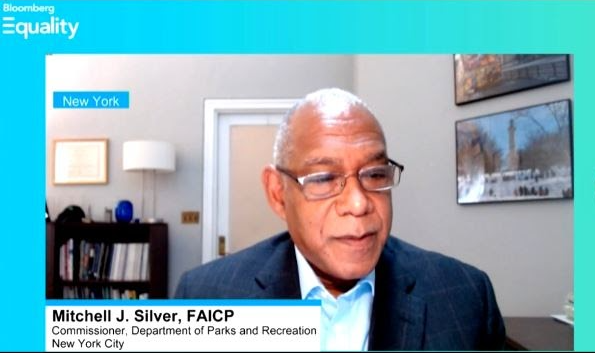
This Bloomberg Equality briefing is Proudly Sponsored By

——————————
Join the Conversation: #BloombergEquality
Instagram: @BloombergLive
LinkedIn: Bloomberg Live
Twitter: @BloombergLive
Interested in more Bloomberg Live virtual events? Sign up here to get alerts.
——————————